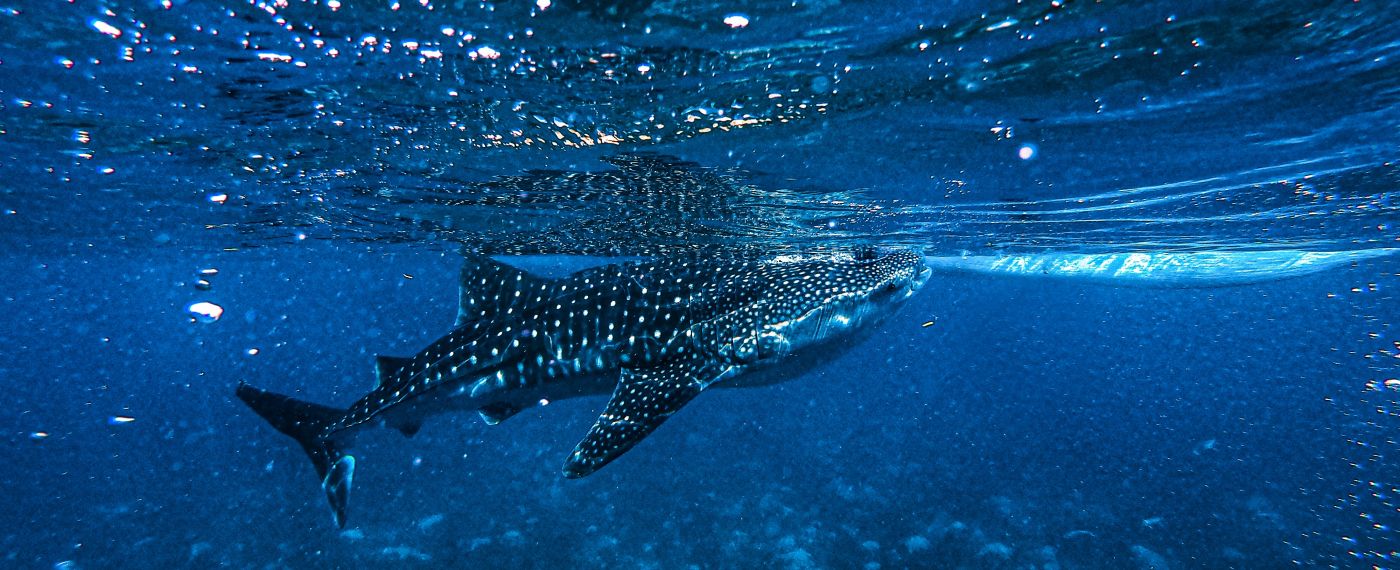
Swimming with whale sharks is an elusive bucket list item for adventurous travellers who come to the Maldives. It requires fortunate timing, weather and of course, whale shark sightings – COMO Maalifushi prepares you for luck when it strikes.
In the Maldivian evenings from November to April, local fishermen tie their boats to buoys and bob in the calm, sunset-lit waters of Thaa Atoll. The fishermen go about their business, but their eyes are on the water for a telltale ripple or the flash of a fin. It’s whale shark season – when the largest sharks in the world travel thousands of kilometres to reproduce – and the waters around fishing boats are excellent pit stops for food. By the light of his boat, a fisherman sees a pair of blunt snouts and metres of spotted, striped skins as unique as fingerprints. He picks up the phone and calls a direct line to COMO Maalifushi.

You’ve had your briefing ahead of time, where you were taught how to interact with the whale sharks: maintain at least three metres from the body and at least four metres from their powerful tails. You’ve been fitted for your wetsuit, which hangs labelled and ready to go alongside snorkels, towels and torches. You were given a simple brick phone and told to wait for only one caller: our marine team, between 6.00pm and 10.00pm.
Your phone rings. The whale sharks are here. You have fifteen minutes to get to the Marine Sports Centre.

The wind whips across dark waves; the boat ride is about 20 minutes east from our resort. The crew pulls up next to the fishing boat that spotted the whale sharks and it’s already a sight you’ll never forget: two usually solitary behemoths feeding vertically side by side. They are sharks, but feed through their gills on tiny creatures like plankton. Giant, but gentle. There is almost no one else in the area besides your group of 14 that includes snorkellers, observers and professional guides.
The whale sharks feed happily and seem to be staying a while. You gear up, then enter the water from a speedboat. The underwater spectating experience has a greater purpose. You are taking photographs of the whale sharks – without flash – not just for yourself, but to aid the efforts of Ecocean in tracking the endangered, protected population in the Maldives. Footage from each expedition is cross-checked on two systems – Wildbook and the Maldives Whale Shark Research Programme – to see if it’s a new whale shark based on size, sex, pattern, time and location of sighting. There are 600 to 700 identified whale sharks in the Maldives, 24 of which frequent the Thaa Atoll – all precious. You hope this one is new; you’ve already chosen a name.


Your body casts a shadow about one-fifteenth the size of a whale shark. Understandably, they are unbothered by your miniature, watching presence. It’s different when you meet their eyes and consider that these huge fish might be watching you too.
As adrenaline courses through your body, you remember what you’ve been taught: don’t ‘duck-dive’ in front of their faces. Whale sharks can ‘bank’ by turning their bodies sharply when threatened, and then you must hope to not be in the way. They’re not aggressive creatures and neither are you, but their sheer size bears consequence. In the wild, intentions are secondary to instinct. Don’t bother one another – it feels like a natural behavioural pact, ironically often lost in human environments. For a moment, you feel fear. But you blink and the whale sharks are just grazing while you float. Creatures co-existing in boundless underwater space.

As you clamber back onto the boat and it pulls away from the moment, you realise marine life moves to a rhythm you’ll never fully understand. Even if you were not there to glimpse the feat, the whale shark pods would be making their long way across warm, azure waters on their maternal mission, swollen bellies in tow, uncertainty ahead. You think of life on land, where you do the same through routine upon routine to often inadequate recognition. Maybe no one should need a witness to feel validated. Maybe the journey alone is worth it.
When you arrive back at the resort, it’s hard to believe only two hours have passed since you picked up the phone. You make your way back to your villa with salt in your hair and on your cheeks. Waves crash in the distance beyond the island’s soft white sand and swaying palm trees, but the ocean feels closer than it did before.
As of October 2024, whale sharks are classified as a protected species in the Maldives. In compliance with the new regulations, COMO Maalifushi is no longer offering the whale shark night snorkelling experience.
For day-time whale shark excursions, COMO Cocoa Island offers snorkelling with a sandbank picnic.
W. COMO Maalifushi | E. maalifushi@comohotels.com | T. +960 678 0008
W. COMO Cocoa Island | E. cocoaisland@comohotels.com | T. +960 664 1818


